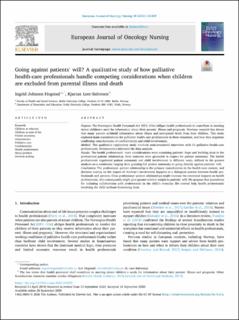| dc.contributor.author | Hogstad, Ingrid Johnsen | |
| dc.contributor.author | Leer-Salvesen, Kjartan | |
| dc.date.accessioned | 2023-12-06T19:15:11Z | |
| dc.date.available | 2023-12-06T19:15:11Z | |
| dc.date.created | 2020-09-08T09:30:21Z | |
| dc.date.issued | 2020 | |
| dc.identifier.citation | European Journal of Oncology Nursing. 2020, 49 (December), 1-8. | |
| dc.identifier.issn | 1462-3889 | |
| dc.identifier.uri | https://hdl.handle.net/11250/3106294 | |
| dc.description.abstract | Purpose: The Norwegian Health Personnel Act (HPA §10a) obliges health professionals to contribute to meeting minor children's need for information about their parents' illness and prognosis. Previous research has shown that many parents withhold information about illness and anticipated death from their children. This study explored main considerations for palliative health-care professionals in these situations, and how they negotiate conflicting considerations of confidentiality and child involvement. Method: This qualitative exploratory study involved semi-structured interviews with 11 palliative health-care professionals. Hermeneutics informed the data analysis. Results: The health professionals' main considerations were sustaining patients' hope and building trust in the professional–patient relationship. Both concerns were grounded in respect for patient autonomy. The health professionals negotiated patient autonomy and child involvement in different ways, defined in the present analysis on a continuum ranging from granting full patient autonomy to going directly against patients’ will. Conclusions: The professional–patient relationship is the primary consideration in the health care context, and decision making on the degree of children's involvement happens in a dialogical process between health professionals and patients. Close professional–patient relationships might increase the emotional impacts on health professionals, who consequently might give greater relative weight to patients' will. We propose that procedures for initiating collaboration with professionals in the child's everyday life context help health professionals involving the child without threatening trust. Keywords: children as relatives, children as next of kin, patient autonomy, hermeneutics, palliative care, confidentiality, health professionals, moral problem, decision-making | |
| dc.description.abstract | Going against patients’ will? A qualitative study of how palliative health-care professionals handle competing considerations when children are excluded from parental illness and death | |
| dc.language.iso | eng | |
| dc.relation.uri | https://doi.org/10.1016/j.ejon.2020.101839 | |
| dc.title | Going against patients’ will? A qualitative study of how palliative health-care professionals handle competing considerations when children are excluded from parental illness and death | |
| dc.title.alternative | Going against patients’ will? A qualitative study of how palliative health-care professionals handle competing considerations when children are excluded from parental illness and death | |
| dc.type | Peer reviewed | |
| dc.type | Journal article | |
| dc.description.version | publishedVersion | |
| dc.source.pagenumber | 1-8 | |
| dc.source.volume | 49 | |
| dc.source.journal | European Journal of Oncology Nursing | |
| dc.source.issue | December | |
| dc.identifier.doi | 10.1016/j.ejon.2020.101839 | |
| dc.identifier.cristin | 1827960 | |
| cristin.ispublished | true | |
| cristin.fulltext | original | |
| cristin.qualitycode | 1 | |
